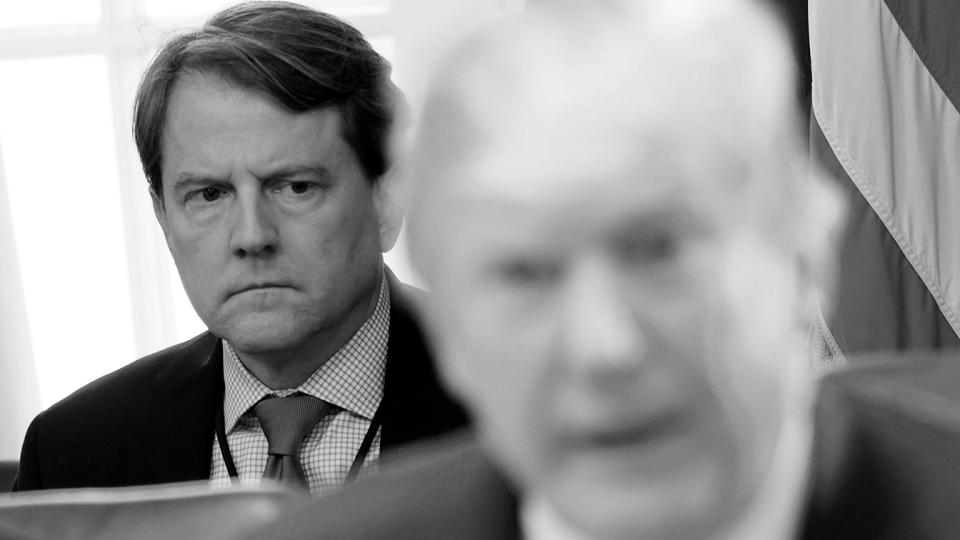McGahn's role in the Mueller investigation comes into focus in book by reporter Michael Schmidt
A new book by New York Times reporter Michael Schmidt details the “extraordinary collision of events” that led Don McGahn to become a witness against President Trump during the Mueller investigation while still serving as White House counsel.
Walking a tightrope between personal legal risks and the wrath of his volatile boss, McGahn continued to work for Trump because he saw a “never-again” opportunity to put a lasting conservative stamp on the federal courts, Schmidt said in a Friday interview with the Yahoo News “Skullduggery” podcast.
According to Schmidt, Trump relied much more heavily on McGahn in selecting judicial nominees than past presidents had with any single adviser, giving his counsel unprecedented power to shape the judiciary according to his ideological principles.
The book, Donald Trump v. the United States: Inside the Struggle to Stop a President hit stores Tuesday.
McGahn chose nominees that were not only conservative, but also young, in order make the most of Trump’s lifetime appointments and shift the courts to the right.
“We’re going to live in McGahn’s America for decades — decades and decades to come,” Schmidt said.
McGahn took enormous risks to keep himself in that powerful position, essentially becoming a key witness against his client in former special counsel Robert Mueller’s investigation into Russian interference in the 2016 presidential election.
McGahn was one of the first witnesses that Mueller’s team asked to interview. At the time, in the summer of 2017, the president’s personal lawyers, John Dowd and Ty Cobb, advised Trump to cooperate with Mueller rather than put up legal roadblocks such as asserting executive privilege to prevent witnesses from testifying. The more Trump cooperated, they initially believed, the sooner the investigation would be over.
But Dowd and Cobb did not consider that the testimony of McGahn and others would actually get Trump in hotter water, Schmidt said. “They took Trump at his word that he had done nothing wrong,” Schmidt said.
McGahn faced a dilemma, according to Schmidt. “McGahn is very conflicted because he believes in Trump, he believes in Trumpism, he believes in remaking the courts and he knows he’s going to inflict great damage. … And McGahn knows that he could easily get roped into something.” Schmidt said, adding, “If there’s going to be a conspiracy to obstruct justice case, McGahn could easily get roped into that regardless of whether he did the right thing or not.”

But rather than resign as White House counsel, McGahn stayed in the role, putting himself in the dangerous position of being a witness against a president he was continuing to serve.
“Here you had the president’s lawyer,” Schmidt explained, “someone who had good command of the facts, who was not a liar who was answering questions about what his client was saying behind closed doors. ... It’s like a dream witness.”
McGahn gave Mueller key information about Trump’s attempts to impede the Russia investigation “ranging from wanting loyalty to wanting loyalists to oversee the investigation to wanting to curtail investigations to ultimately wanting to ... to get rid of Mueller.”
McGahn also told investigators that Trump wanted to prosecute James Comey, the FBI director he had fired, as well as Hillary Clinton.
Mueller’s prosecutors “basically had unfettered access” to the top White House lawyer, Schmidt said. “It’s an ongoing live obstruction investigation into the president. Trump is doing things and he is spawning tentacles of this investigation in almost real time.”
“One of the most remarkable things that I found out,” Schmidt continued, “is that this cooperation becomes so extensive that there are what I would call near real-time requests for information going from Mueller’s office to McGahn’s lawyer to find out what Trump is saying behind closed doors.”
McGahn’s personal lawyer even prompted him to proactively disclose a damaging fact that Mueller’s investigators were unaware of and had not asked about — that Trump had pressured McGahn to fire Mueller.
McGahn’s testimony was key to the Mueller report’s obstruction of justice findings. The report was made public in July 2019.
According to Schmidt, McGahn was especially motivated to remain in his position in the spring of 2018 to ensure that Supreme Court Justice Anthony Kennedy would be replaced with an ideological conservative. “McGahn thinks, ‘I need to stay here. If I do not stay, Kennedy might not retire, because he doesn’t trust that Trump won’t put a Fox News analyst on the court. … I’m going to stay through the end of the Supreme Court term and try to see if Kennedy will retire, because if Kennedy retires, I’ll get another shot at the court,’” Schmidt said.
Justice Kennedy in fact announced his retirement in July 2018. Months later, the Senate confirmed Brett Kavanaugh, fulfilling McGahn’s mission.
_____
Read more from Yahoo News:

